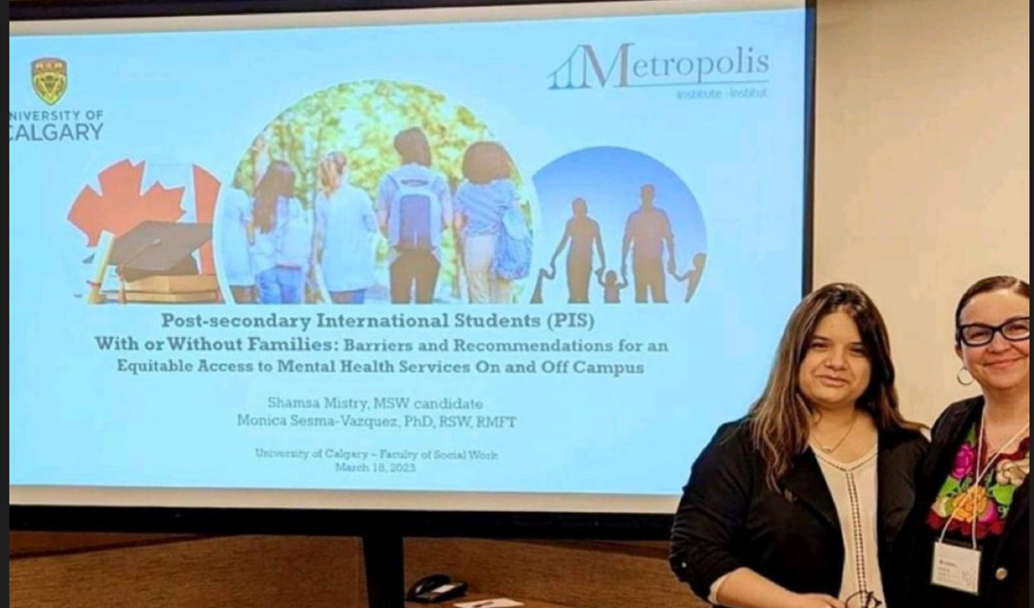March 13, 2024
Faculty of Social Work advocates for international students' well-being

International students — a significant, yet often overlooked group — face many challenges pursuing post-secondary education.
Representing a substantial 19 per cent of the student body at the University of Calgary as of fall 2023, these individuals and their families embark on a journey fraught with unspoken obstacles.
Recognizing the need for a comprehensive understanding of these issues, researchers from the Faculty of Social Work launched a groundbreaking project to unveil the lived experiences of international students and shed light on the unique struggles faced by those who arrive with and without their families.
The project, University of Calgary Post-Secondary International Students with or without Families: Barriers and Recommendations for an Equitable Access to Mental Health Services On and Off Campus, is led by Dr. Monica Sesma-Vazquez, MSW’18, PhD (principal investigator), along with Shamsa Mistry, MSW’23 (research co-ordinator and registered social worker), and Karen Lazaruk (research assistant).
Behind the research
Sesma-Vazquez is an assistant professor with a rich background in mental health and therapy. Having left her hometown of Mexico City a decade ago to seek international experience and engage in mental health research and academia in North America, Sesma-Vazquez brings a unique perspective to the project.
Her journey began with the challenges of navigating an unfamiliar educational system, compounded by the struggle of having her credentials from Mexico not immediately recognized in Canada. This experience sparked her awareness of the difficulties faced by international students arriving alone or with their families, becoming a driving force behind the research project.
Mistry arrived in Canada on a study permit in 2021 and grappled with the intricacies of renting a house, securing part-time employment, balancing academic and familial responsibilities, and adapting to a new cultural context. These personal experiences fuelled Mistry's advocacy for international students, forming the bedrock of the research project.
Identifying the gaps
Sesma-Vazquez and Mistry's observations led to a critical realization: International students arriving with families encounter distinctive challenges often overlooked by existing support systems. Intensive literature review over two years highlighted that, unlike refugees and immigrants, international students and their families — not classified under these categories as they usually don’t expect to remain in Canada indefinitely — lack adequate resources for a seamless transition.
“Services intended to assist newcomer residents are inaccessible to those who lack permanent status, making them ineligible for the only available support tailored to their needs," says Sesma-Vazquez.
"What we found, even from our personal experience, is that there is something broken between post-secondary institutions and government and provincial services. This gap in support can result in heightened challenges related to finances, weather adjustments, food costs and living expenses.”
The project underscores the misconception that post-secondary institutions are solely responsible for the onboarding of international students and their families. The lack of provincial and federal support further exacerbates the struggles faced by these students.

Shamsa Mistry (left), and Monica Sesma-Vazquez at the 2023 Metropolis Conference
Image provided by Monica Sesma-Vazquez
Mental health focus
Sesma-Vazquez says those who arrive with families have the unique challenge of taking on the added responsibility of caring for parents, siblings and other family members who may be struggling with adjusting to a new country.
“This extra pressure can negatively impact the student’s mental health which, in turn, plays negatively on academic performance,” she says.
In contrast, those who come on their own struggle with feeling more isolated because they are disconnected from their cultural communities.
In response to this realization, Sesma-Vazquez and her colleagues collaborated with the director of UCalgary’s Campus Mental Health Strategy (CMHS), Dr. Andrew Szeto, PhD, who says the CMHS is in full support of the research project. In the pursuit of understanding and addressing the challenges faced by international students, Szeto emphasizes the importance of prioritizing mental health.
“The unique challenges faced by these students and their families, from navigating a new academic environment to navigating cultural differences, can significantly impact their mental health and well-being,” says Szeto.
“By better understanding their experiences and prioritizing mental health initiatives tailored to the international student community, we aim to create a supportive environment that acknowledges and addresses these challenges.”
Join the study
The overarching goal of the research project is to engage and collect the voices of as many international students as possible via a short 20-minute survey to provide insights into missing services. The research aims to gather at least 200 participants, using the data to enhance the overall life of international students on campus and to inform other institutions across the nation, catalyzing improvements in their processes and fostering partnerships.
By amplifying the voices of international students and leveraging the personal experiences of researchers like Sesma-Vazquez and Mistry, the Faculty of Social Work is shaping a more empathetic and supportive educational environment, with the potential to inspire transformation within the university and beyond.
Participation in the survey is not only an opportunity for international students to share their story, but to also advocate for support and services. For questions regarding the survey and project, contact Sesma-Vazquez via email at msesmava@ucalgary.ca.
The University of Calgary's Faculty of Social Work, one of the largest in Canada and consistently ranking among the top 15 in North America for research productivity, is committed to impactful research that addresses social determinants and advances the social work profession. Embracing an interdisciplinary approach with a focus on social justice and human rights, their research seamlessly aligns with UCalgary’s strategic priorities Human Dynamics in a Changing World, and Brain and Mental Health. The faculty has established itself as a global intellectual hub, leaving a lasting impact on communities at local, national and international levels through meaningful community engagement.







